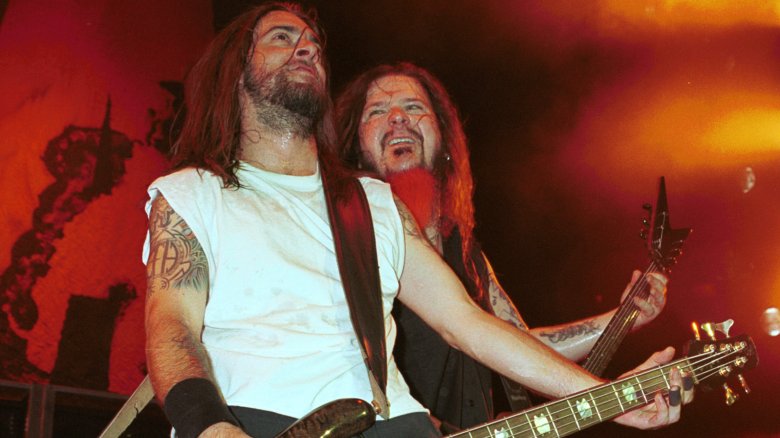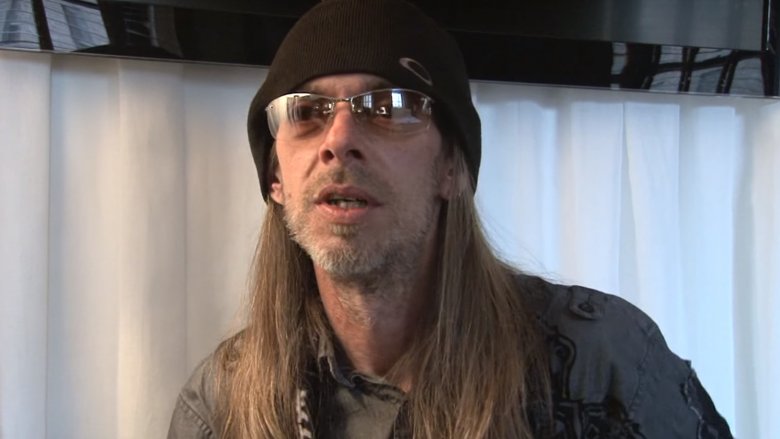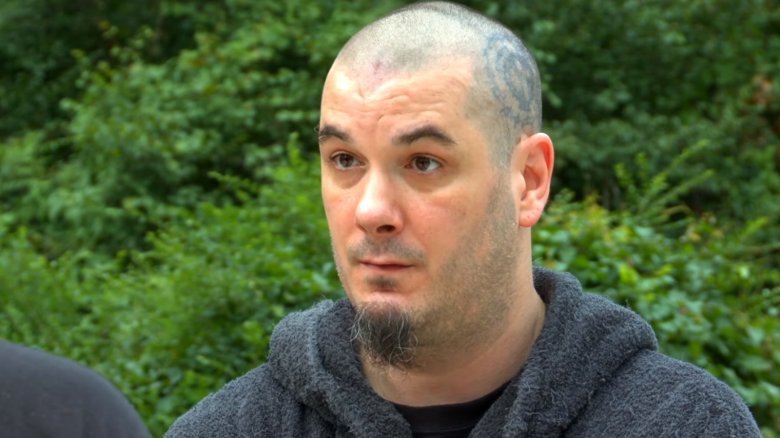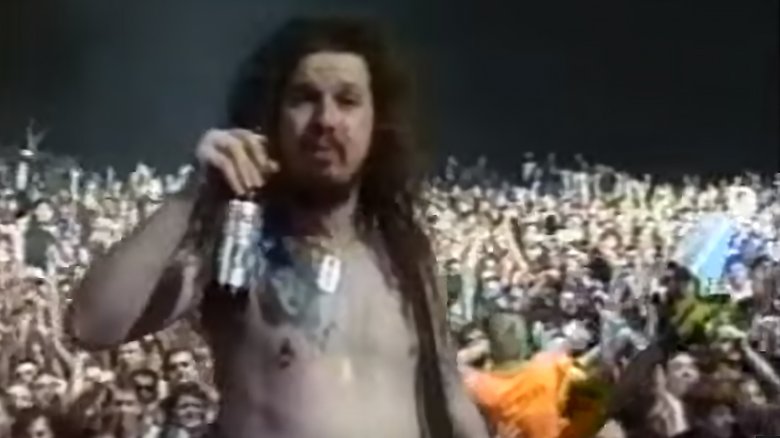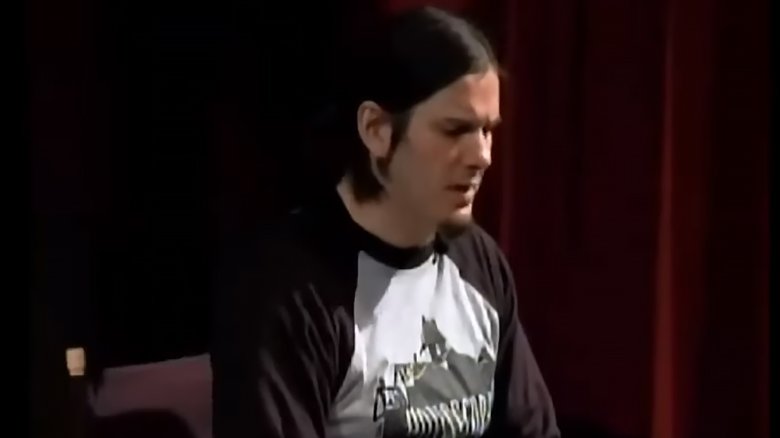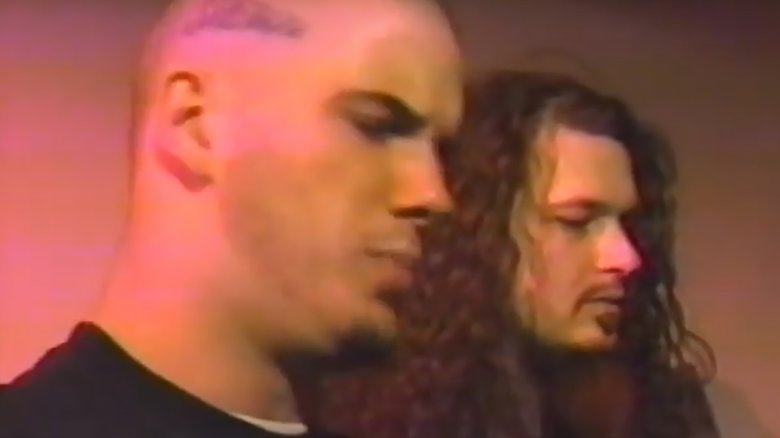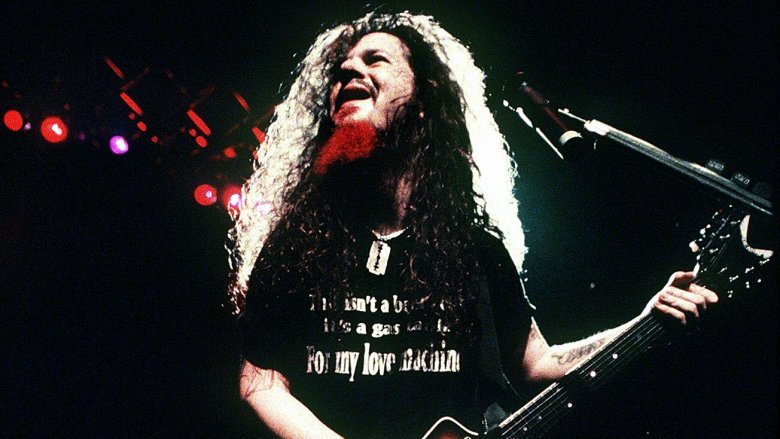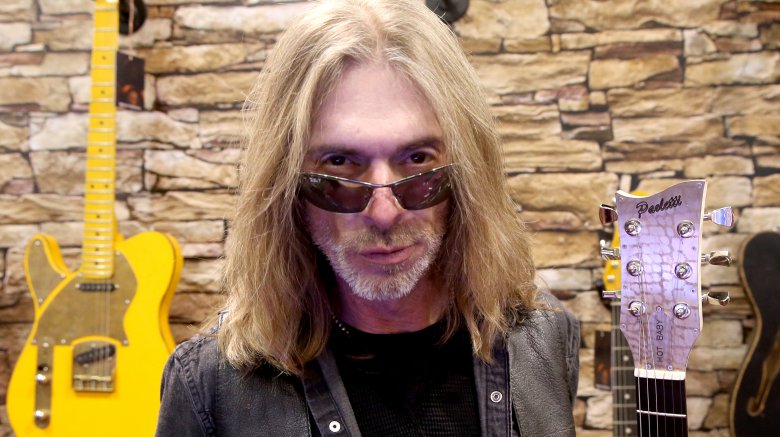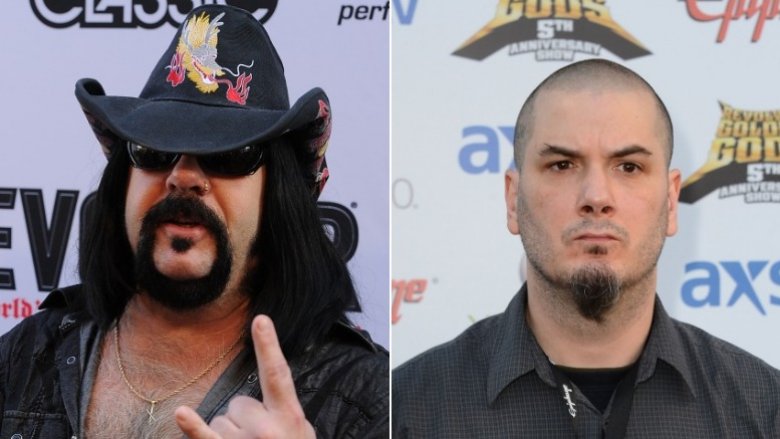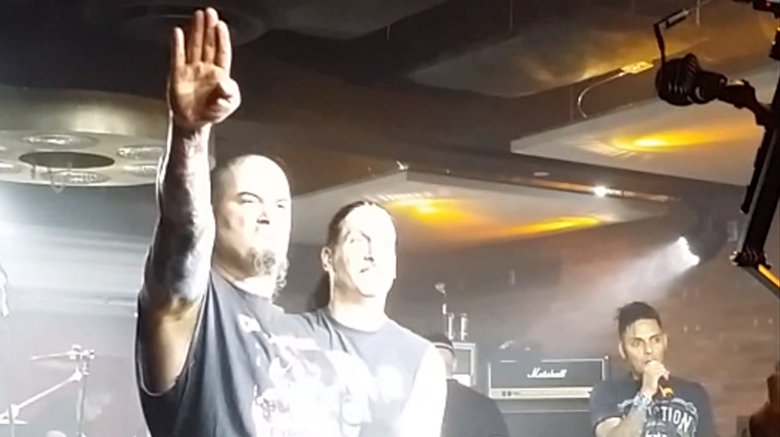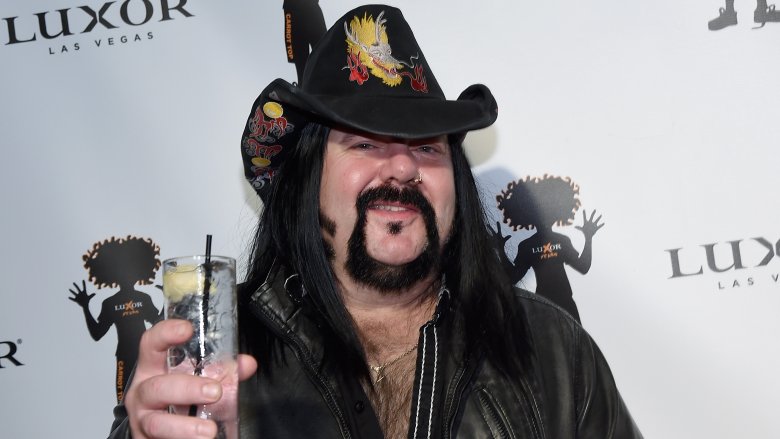Pantera's Tragic Real-Life Story
Pantera were the originators of groove metal, and the genre's kings. During their heyday in the '90s, few other bands could go toe-to-toe with them in terms of aggression, sophistication, and sheer blunt power. The sophistication came from the riffs and solos of guitarist "Dimebag" Darrell Abbott, who is still considered by aficionados to be among the finest guitar players who ever strapped on a six-string. His brother, drummer Vinnie Paul Abbott, provided triphammer percussion and, with bassist Rex Brown, comprised the most formidable rhythm section in metal. Pantera's sound served as the funnel through which singer Phil Anselmo let loose his rage at authority, his enemies, and himself. Songs like "Walk," "Revolution is My Name," "Mouth for War," and "Sandblasted Skin" were a soundtrack for the disaffected, and a loud one at that.
Pantera bore their share of hardships, both individually and collectively. Childhood tragedy planted the seeds for adult aggression and transgression for some of the band, and the twin monsters of drugs and alcohol ran neck-and-neck toward the final line that finished the band. Even when band members were largely done with one another, fate dealt them all the ultimate bad hand, resulting in the grisly murder of their most beloved brother. This is the tragic real-life story of one of metal's greatest bands.
Rex Brown's dad died young
Rex Brown was born in 1964 and grew up in DeLeon, Texas. His father was 40 when Brown was born, and his sister (17 years his senior) got married and moved out of the house when he was 3 years old. In his memoir, Official Truth, 101 Proof, Brown recalls being surrounded by music as a kid, from the Louis Armstrong and Tommy Dorsey records his mother loved, to the Beatles singles his sister left behind, to the Charles Mingus records his grandmother would play along with as Brown sat on her knee at the piano.
Tragedy struck the family in 1971; Brown's father, whom he called "Daddy Bill," was diagnosed with cancer of the sinus cavity, a rapidly moving strain of the disease that killed him in January 1972, when Brown was just 7 years old. Throughout his father's treatment, Brown's parents tried to keep up a veneer of normalcy, and when Daddy Bill's condition worsened, Brown was sent off to stay with a series of relatives, and had very little idea of the extent to which his father's health was deteriorating. Brown was playing in the yard when his mother came out to tell him his father had died. "Although I was still young," he wrote, "I can still vividly remember that the first thing my mother said was, 'I don't know what I'm going to do.' I didn't have an answer. I was a kid. I kept playing."
Phil Anselmo was molested as a child
Phil Anselmo does not speak of his childhood often, but when he does, the stories are dark — stories no kid should have to go through. He grew up in New Orleans, raised in the French Quarter by his mother and aunt. (His father lived nearby, too, and ran a restaurant in town for years.) It was the time of the Vietnam War, a conflict that caused rifts between generations and often had the world holding its breath over what would happen next. Anselmo's aunt's boyfriend served in the war, and when he came home, the war came home with him. "I lived with Vietnam in my house," Anselmo told Revolver. "I have vivid memories of my childhood, and one of those memories is waking up to night terrors — this grown man screaming in his sleep from dreams of war."
Anselmo also felt the pain of abuse. In an interview with Rolling Stone, he railed against a culture of victimhood and, in a startling and unexpected admission, told the magazine, "Guess who was molested his entire child-f*cking-hood by numerous people, both men and women. ... Me." Anselmo gave no other detail, except to say he had never told "the world" before that moment, "but it happened."
Alcohol fueled the band
Pantera were infamous for their hard-partying ways, particularly on tour. One of the band's crew, Aaron "Wires" Barnes, told VH1 (in a Behind the Music episode on the band), "They were the only band I've ever known that if you didn't drink, you'd get fired." Pantera's tour rider (an artist's contractual demands for items like food and drink at venues) is a virtual liquor store. Backstage, the band demanded liters of whiskey, vodka, and bourbon, plus several cases of beer and several bottles of wine. The band's production office required liters of booze and a bottle of French wine. Onstage, they demanded two cases of beer and two liters of whiskey. These were nightly requirements for tours that could run 80 or more nights.
Some of the mayhem caused by such copious consumption of alcohol was caught on film; mostly, though, it is the stuff of legend, handed down in stories told by the people who were there and shouldn't be able to remember anything, but do. Alcohol continues to be a part of Phil Anselmo's life, as are the offensive and embarrassing things he occasionally does while under the influence, like ranting about "white power" from the stage at a tribute to Dimebag Darrell. (He later apologized.) Rex has given up the stuff, telling The Rock Pit "I quit drinking completely; I don't even think about it, and it's just amazing now."
Drugs nearly killed Phil Anselmo
Phil Anselmo might have been anticipating his eventual slide into drug addiction in Pantera's 1994 song "Hard Lines, Sunken Cheeks," when he sang "I drink all day. I smoke all day. ... I've done it all but tap the vein." At the time, he was dabbling in painkillers, looking for a way out of his misery. He told Loudwire the song "is me being afraid for me in the long run. And it was warranted." Years of thrashing onstage had left Anselmo's back a mess; according to New Orleans' Times-Picayune, he had a blown disc in his back, which damaged the cartilage around the disc, and playing show after show, tour after tour, damaged more cartilage. Anselmo sought medical help, but discovered the surgery to fix his back required up to 18 months of recovery time, a commitment he was unwilling to make, with Pantera at the top of their game.
He turned to heroin to numb his pain, and developed a debilitating addiction that nearly took his life. In fact, on July 13, 1996, after a Pantera show, Anselmo shot up too much of the drug and flatlined for five minutes before paramedics were able to resuscitate him. He told VH1 that when he woke up "I didn't know what had happened. I had all these tubes hooked up to me and I sat straight up and threw up immediately. This nurse leaned over and said to me, 'Welcome back to life. You overdosed on heroin.'"
Addiction and silence drove the band apart
The relationships between Phil Anselmo and his bandmates in Pantera were never the same after his overdose in 1996. Vinnie Paul Abbott told Blabbermouth that, in the aftermath of that incident, Anselmo separated himself from the rest of the band, riding in his own tour bus and only interacting with the rest of the group just before showtime. "You never knew which Phil you were gonna get," Abbott remembered. "You might get the pitbull that we all knew and loved, or you might get some dude who was completely whacked out on heroin." In 2001, Pantera decided a break was in order — their first since Anselmo joined the band in 1986. A planned one-year hiatus became permanent in 2003, as Anselmo cut off communication with the Abbott brothers and immersed himself in side projects like Superjoint Ritual and Down.
The rest of the group was left angry and disappointed. "I really felt like we were gonna be the Rolling Stones of heavy metal, and we could have been," Vinnie Paul Abbott said. Instead, the Abbott Brothers formed Damageplan, Rex Brown eventually joined Down, and one of the great metal bands of the '90s was no more. Still, there was sniping in the press, mostly between Anselmo and Dimebag Darrell. The back-and-forth reached a head in 2004, when Anselmo told an interviewer that Dime "deserves to be beaten severely." It was a comment that would widen the rift between Anselmo and his former bandmates, a distance that would never be bridged.
Dimebag Darrell murdered on stage
In 2004, the Abbott brothers' band Damageplan released their debut record, New Found Power, and headed out on tour, getting back to playing in front of audiences for the first time in three years, since Pantera's hiatus-turned-breakup began. On December 8, the band took the stage at the Alrosa Villa in Columbus, Ohio, and launched into "Breathing New Life," as they had for 33 previous shows on the tour. According to Rolling Stone, Dimebag Darrell was getting into it, headbanging, his hair in his face, when 25-year-old Nathan Gale calmly walked onto the stage, pointed his Beretta 9mm handgun at Dime's head, and pulled the trigger. The music stopped and a security guard tackled Gale, who kept firing. The melee ended when Columbus police officer James Niggemeyer arrived with a 12-gauge shotgun and killed Gale. Gale killed four people that night, including a fan, a club employee, one member of the band's security team, and Dime.
The unimaginable tragedy sent shock waves around the global metal community. Metal heroes like Judas Priest front man Rob Halford, Ted Nugent, Black Sabbath's guitarist Tony Iommi, Lemmy from Motorhead, and Kiss principals Paul Stanley and Gene Simmons sent out immediate messages of support. Dime was buried in a Kiss casket and eulogized by his friend Zakk Wylde and hero Eddie Van Halen, who had the guitar he had used to record Van Halen II placed in the casket with Dime. Metal had lost a giant.
Rex goes down with health problems
On tour in Europe with Down in 2009, Rex Brown began experiencing acute pain in his abdomen, a symptom he had reportedly been dealing with off and on for five years. Upon his return to the U.S., Brown sought the help of specialists, who diagnosed him with acute pancreatitis. Brown's condition required surgery — he had developed polyps in his pancreas, as well as an issue with his gallbladder. Two operations took Brown off the road for the remainder of 2009, but he rejoined Down in 2010, only to leave the band for good the next year.
At that time, Phil Anselmo voiced concern that Brown's drinking — which might have exacerbated his condition — would be his undoing. In an interview with High Times, Anselmo said, "I love Rex Brown with all of my f*cking heart and soul. But ... he will not put down that f*cking bottle for any of us." Brown responded in another interview by saying, "Number one: Phil is not a doctor. Don't believe what you read." By 2013, all appeared to be well with Brown, who had quit drinking and was attacking new musical projects (like his band Kill Devil Hill) with a renewed vigor. " I'm in better shape than I've been in ten years," he told The Rock Pit, adding that a new health regimen had "brought back that hunger, that feeling that you have when you are starting anew again."
Toxic talk between Vinnie and Phil
Dimebag Darrell's family, including his brother Vinnie Paul, made it known to Phil Anselmo that he was not welcome at Dime's memorial. They were aware of the interview in which Anselmo had said Dime deserved to "be beaten severely" and were not inclined to be around the singer at that moment, a moment that extended for years. In that time, occasional talk of a Pantera reunion would surface, with Ozzy Osbourne and Black Label Society guitarist Zakk Wylde (one of Dime's best friends) filling in. Anselmo told journalist Matt Pinfield that he would get in the "best shape possible" for such a reunion; Wylde indicated he would be up for it as well.
Vinnie Paul Abbott would not approve of such a reunion, nor of speaking with Anselmo at all. The two never spoke in person after Pantera's final show, preferring to fire shots at one another in the press. "He's done a lot of things that tarnish the image of what Pantera was back then and what it stood for and what it was all about," Abbott told a Brazilian news outlet. Anselmo responded by telling Rolling Stone, "Anything out of that dude's mouth ... seems sour. ... You have to worry about [Vinnie Paul]'s state of mind." Dime's girlfriend, Rita Haney, had spoken of her hope for some reconciliation between the two, if only to honor Dime, but it was not to be.
Phil Anselmo fights off accusations of racism
The term "racist" is a heavy accusation to hang on a person, and while Phil Anselmo has denied being a racist, his actions sometimes belie his claim. In January 2016, at a celebration of Dimebag Darrell's life called Dimebash, Anselmo took the stage alongside Dave Grohl, Metallica bassist Robert Trujillo, and former Slayer drummer Dave Lombardo to play some Pantera songs. At the end of his performance, he gave the crowd a Nazi salute and yelled, "White power!" stunning his fellow musicians, as well as the fans who watched video of the incident. He at first claimed it was a joke (he had been drinking white wine all evening), then he apologized, saying he was drunk and didn't mean it.
But it was just one of several such incidents that have made fans question his motives. At a 1995 Pantera show, Anselmo went on a rant about "black rap bands" and announced, "Tonight is a white thing" (after prefacing his remarks with, "We're not a racist band"). At another point during the peak of Pantera's popularity, MTV's Kurt Loder interviewed Anselmo while the singer was wearing a T-shirt featuring a triskelion — a symbol of oppression in South Africa; the interview was about some fans shouting "White power!" at the band's concerts. Again, Anselmo denied he was racist, as he has several times over the years. Someday, maybe his actions will line up with his claims.
Vinnie Paul dies
Any talk of reuniting Pantera likely ended on June 22, 2018, when Vinnie Paul Abbott was found dead, likely of a heart attack, according to friends. He was 54 years old. As was the case when Dimebag Darrell was murdered, tributes from the metal community streamed in as the news spread. Among the artists that paid tribute to Abbott from the stage were Poison, Puddle of Mudd, Megadeth, Volbeat, and Sebastian Bach. Abbott was laid to rest in a private funeral service; Kiss' Paul Stanley and Gene Simmons provided a Kiss casket to Abbott's family, similar to the one Dime was buried in.
For Rex Brown and Phil Anselmo, Abbott's death hit particularly hard. Brown released a lengthy statement in tribute to Abbott, two weeks after he died. In addition to sharing condolences and personal anecdotes, Brown wrote of his friend's legacy: "He changed the game. He was the original for his generation, a generation that's still going. Everybody wanted to play like him." Anselmo initially posted on Instagram a simple picture of a candle, without a caption, and let his fans express their condolences in the comments. At a public memorial for Abbott, Anselmo was seen in an 8-second video in which he said, simply, "Vince, I'll always have love in my heart for you, man. Rest in peace."
